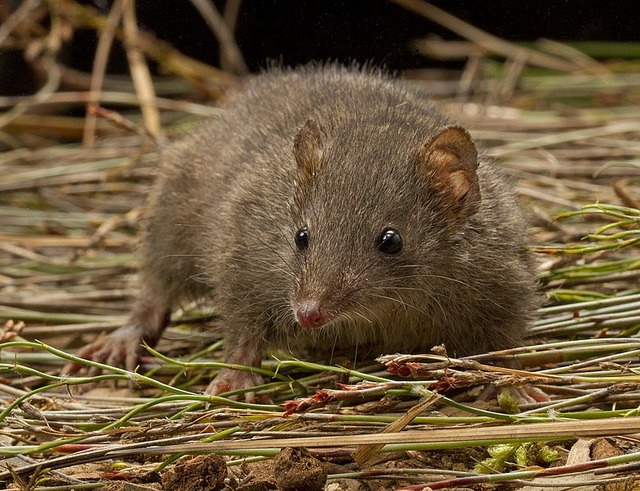Dusky antechinus male gives himself little rest

A male dusky antechinus must do everything he can in the only short mating season he experiences. He sacrifices hours of sleep, Erika Zaid and colleagues show.
As for all species, producing as many offspring as possible is what life is all about for the dusky antechinus, Antechinus swainsonii. For males, which do not care for young, this means that they have to mate with as many females as possible, because every successful mating may increase the number of young they sire. To achieve this, only three weeks are available, because this is the period in which all females are fertile. Males experience fierce competition; as a consequence of the pressure to face this, they are twice as heavy as females.
This short and intensive mating season has a very bizarre ending for males: they all die. Females, that carry the young in a flap of skin (they have no complete pouch), stay alive and many of them experience a second reproduction season the next year. But for males, it is over after one time.
To score as many partners as possible in that single mating season, males cut back on rest, Erika Zaid and colleagues discovered.
Testosterone
The dusky antechinus, a species of broad-footed marsupial mice, is an insectivorous predator that lives in Australia. Before the mating season, male and female sleep an average of more than 15 hours per day. During the mating season, measurements of physical activity and EEGs show that males reduce this to 12 hours on average: 20 percent less. The increased activity, which they exhibit especially at night, is accompanied by a higher level of the male sex hormone testosterone in the blood, giving them extra time and strength to find females and get access.
Unfortunately, the researchers do not know whether males that sacrifice much sleep actually father more offspring. Also, they did not investigate whether males compensate for the lack of sleep by sleeping more deeply.
Sleeping less jeopardizes health. The concentration of corticosteroids, which suppress the immune system, increases, with ultimately fatal consequences. But because males will die soon anyway, staying healthy is no longer important. Mating more often is now a better strategy than getting enough sleep.
Sustaining
You might think that dusky antechinus males die after the mating season because they have been acting so unhealthy. But that is not how it works, according to the researchers. Their death is a certainty. The increase in corticosteroids hardly contributes anything to this fate, but it does ensure that they can sustain their increased activity.
Willy van Strien
Photo: Antechinus swainsonii. Catching the eye (Wikimedia Commons, Creative Commons CC BY 2.0)
Source:
Zaid, E., F.W. Rainsford, R.D. Johnsson, M. Valcu, A.L. Vyssotski, P. Meerlo & J.A. Lesku, 2024. Semelparous marsupials reduce sleep for seks. Current Biology, January 25 online. Doi: 10.1016/j.cub.2023.12.064